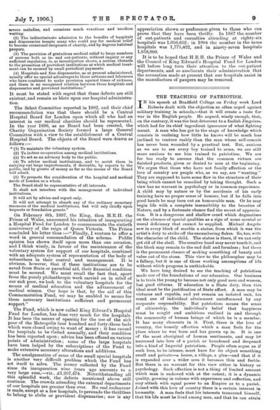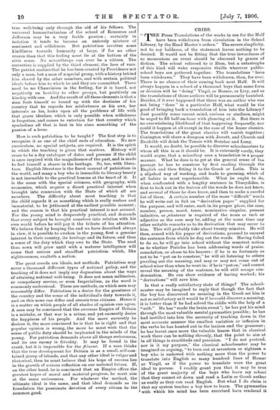THE TEACHING OF PATRIOTISM.
IN his speech at Bradfield College on Friday week Lord Roberts dealt with the objection so often urged against military training in schools,—that it will create a taste for war in the English people. He argued, wisely enough, that, on the contrary, it was the best deterrent to a foolish Jingoism, which bad for its chief ingredient ignorance of what fighting meant. A man who has got to the stage of knowledge which consists in realising bow little he knows will be much less inclined to venture rashly than the man whose self-conceit has never been wounded by a practical test. But, anxious as we are to see every boy trained to arms, we are still more anxious to see him trained to patriotism. We are far too ready to assume that the common virtues are finished products, given or denied to men at the beginning. We argue that those who have not family affection or the love of country are people who, as we say, are "wanting." They are supposed to have some flaw in the structure of their being which cannot be remedied by taking thought. Such a view has no warrant in psychology or in common experience. A child may by nature or by the accidents of his early training have no proper sense of honour, but if he falls into good hands he may turn out an honourable man. Or he may begin life with a complete insensibility to the beauties of Nature, and by a fortunate chance find the secret of apprecia- tion. It is a dangerous and shallow creed which dogmatises on the absence of special qualities as a sign of some mental or moral deficiency that cannot be supplied. Michael Angelo saw in every block of marble a statue, from which it was the artist's duty to strike off the encumbering flakes. So, too, with the character of the child. The statue is there, if we can only get rid of the shell. The creative hand may never touch it, and the block may remain to the end dull and formless ; but there is the permanent chance of making something of beauty and value out of the stone. This view to the philosopher may be a fallacy, but it is one of those working assumptions of life without which progress is unthinkable.
We have long desired to see the teaching of patriotism made one of the foundations of our education. Our business is to train the young to become not only good men and women, but good citizens. If education is a State duty, then this ideal must be the justification of State effort. A man may be virtuous and capable, and yet remain an isolated unit, his creed one of individual attainment uninfluenced by any corporate responsibility. But patriotism means the sense of citizenship, the individual's belief that happiness must be sought and ambitions realised in and through the community of human beings of which he is a member. It has many elements in it. First, there is the love of country, the homely affection which a man feels for the place where he was born and has grown up in. It is one of the most aboriginal of human sentiments, and may be narrowed into love of a parish or broadened and deepened into a kind of Imperial patriotism. People often argue as if such love, to be intense, must have for its object something small and private—a house, a village, a glen—and that if it is expanded over a wider area it becomes thin and feeble. But there is no warrant for this view either in history or psychology. Such affection is not a thing of limited amount which man is endowed with at the outset; it is a dynamic quality, growing in volume with experience and reflection, and may attach with equal power to an Empire as to a parish. Joined with this love of country there is a certain interest in humanity. A man feels that his interests transcend himself, that his life must be lived among men, and that he can attain
true well-being only through the aid of his fellows. The universal humanitarianism of the school of Rousseau and Jefferson may be a very feeble passion ; certainly in isolation it tends to become an unlovely mixture of sentiment and selfishness. But patriotism involves some kindliness towards humanity at large, if for no other reason than that this feeling must lie at the bottom of the civic sense. No misanthrope can ever be a citizen. The corrective is supplied by the third element, the love of race. The patriot realises that he has been created by Providence not only a man, but a man of a special group, with a history behind him shared by the other members, and with certain political ideals before him to which he and they are committed. There need be no Chauvinism in the feeling, for it is based, not negatively on hostility to other groups, but positively on kinship with one. And the result of all these elements is that a man feels himself so bound up with the destinies of his country that he regards her misfortunes as his own, her interests as his, looks upon all the problems of life with that grave idealism which is only possible when selfishness
is forgotten, and comes to entertain for that country which symbolises all that is best in his aims something of the passion of a lover.
How is such patriotism to be taught ? The first step is to recognise it as one of the chief ends of education. No new curriculum, no special subjects, are required. It is the spirit in which the teaching is given that matters. History will cease to be a dry catalogue of dates and persons if the child is once inspired with the magnificence of the past, and is made to feel himself a sharer in the heritage. So, too, with litera- ture. English literature is the finest manual of patriotism in the world, and many a boy who is insensible to literary beauty is not insensible to the practical lessons at the heart of it. It is the same with the special sciences, with geography, with economics, which acquire a direct practical interest when brought into connexion with the State of which all are members. The difficulty about most teaching is that the child regards it as something which is really useless and immaterial, to be jettisoned at the earliest possible moment ; and the reason is that his practical interest is not aroused. For the young mind is desperately practical, and demands that every subject be brought somehow into relation with his own world before he will pay it the tribute of his attention. We believe that by keeping the end we have described always in view, it is possible to awaken in the young, first a genuine interest in their country, its heritage and its future, and then a sense of the duty which they owe to the State. The seed thus sown will grow until with a maturer intelligence will come that serious and steadfast patriotism which, like righteousness, exalteth a nation.
The great creeds are ideals, not methods. Patriotism may cover a thousand different types of national policy, and the teaching of it does not imply any dogmatism about the ways of attaining national well-being. It does not mean militarism, or compulsory service, or even Imperialism, as the word is commonly understood. These are methods, on which men may reasonably differ. Patriotism is a desire for the greatness of the country and the sense of the individual's duty towards it, and on this none can differ and remain true citizens. Hence it is a matter on which people of all shades of opinion can agree. A man may be convinced that the overseas Empire of Britain is a mistake, or that war is a crime, and yet earnestly desire the happiness of his people. And the more earnestly he desires it, the more convinced he is that he is right and that popular opinion is wrong, the more Ile must wish that the sense of public duty should be implanted in the minds of the young. For patriotism demands above all things seriousness, and its one enemy is frivolity. It may be found in the crank, but it is impossible for the jictineur. If a man thinks that the true development for Britain is as a small, self-con- tained group of islands, and that any other ideal is vulgar and rhetorical, then he must believe that his hope of success lies in the growth of serious reflection on our national future. If, on the other hand, he is convinced that an Empire offers the greatest hopes of moral and material progress, he must aim at the same seriousness. For whatever the method, the ultimate ideal is the same, and that ideal demands as its foundation the passionate devotion of every citizen to the common good.



















































 Previous page
Previous page